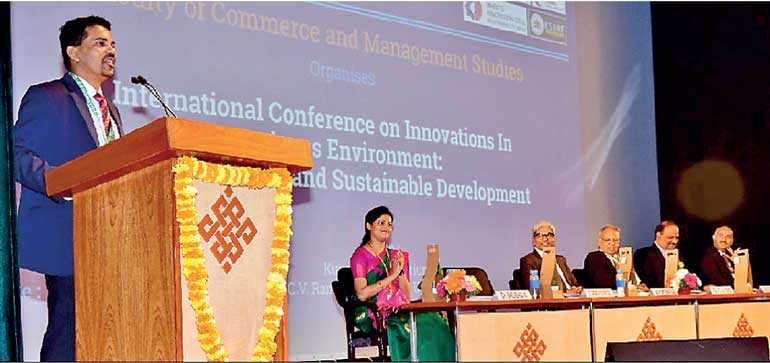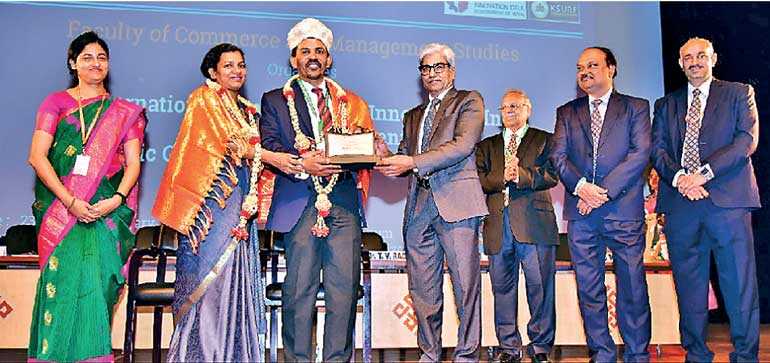Saturday Feb 21, 2026
Saturday Feb 21, 2026
Tuesday, 25 February 2020 00:49 - - {{hitsCtrl.values.hits}}

Dr. Samantha Rathnayake, faculty member and Management Consultant from the Postgraduate Institute of Management of the University of Sri Jayewardenepura, was featured as the Guest of Honour at Reva University in Bangalore, India recently.
He delivered one of the keynotes on the innovation and sustainability agenda at higher education institutions, speaking on the theme ‘Exploring readiness for an inside-out approach’. In addition to the above address, he conducted an interactive session for management faculty students of the same university and addressed an Indo-American Chamber of Commerce roundtable meeting at a different location in Bangalore. TVRLS, Ahmedabad Chairman Prof. T.V. Rao, a former professor at the Indian Institute of Management, Ahmedabad, was the occasion’s Chief Guest.
Innovation is maturing as a subject relating to the improvement and humanitarian sectors, combining rising applied sciences with user-centric, behavioural and lean approaches. These are being driven in part because agencies steadily understand how sustainability creates real value. At any enterprise, innovation is rightly considered a key catalyst for growth. At many organisations, innovation is linked to pleasant changes in efficiency, productivity, quality, competitiveness and market share. A lot of research has taken place in the region with regard to the adoption of sustainable improvement as a policy initiative in recent times, nationally as well as internationally. Both innovation and sustainable improvements are intricately linked.

The main objective of the conference was to provide a platform for practising managers, entrepreneurs, academics and scholars to deliberate on various innovative models in the business environment to achieve sustainable development. It served to emphasise the recent economic growth and development in India and also to evaluate the innovative opportunities and challenges that have emerged in the business environment.
Clayton Christensen’s Theory of Disruptive Innovation posits that an industry is ripe for disruption when a competitor arrives which is not necessarily better but is both cheaper and good enough. Since Christensen’s initial prediction for future institutional bankruptcy, we have combined significant evidence that while online education undoubtedly has a role to play, for the vast majority of learners, it is not and is unlikely to become good enough. What disruptive innovation is as a theory is all too often misunderstood and misapplied.
Disruptive innovations carry four rules worth stating. They typically start by serving non-consumers outside of the mainstream—areas where the alternative is literally nothing at all. They tend to be simpler than existing services, so the elite and the sector’s leading organisations tend to dismiss them. Accordingly, they both redefine the notion of what quality and performance are and they do not fit precisely into existing regulatory structures.
Thirdly, incumbent organisations cannot successfully adopt them within their core operations. And finally, they predictably and reliably improve over time to tackle more complex problems to transform a sector into one that is more affordable and accessible.
In education, online learning is the first disruptive innovation since the advent of the printing press. Combined with competency-based learning, in which students progress upon true mastery of their learning not because of an arbitrary time-based measure, there is a big opportunity to transform our higher education system into a more affordable, student-centred one which is able to serve many more students.

It can be observed that a variety of potentially disruptive organisations powered by online learning emerge from outside traditional higher education. These emerging enterprises are getting those students who need more education but, for reasons of convenience, accessibility, simplicity and cost, are at a point in their lives where they are non-consumers of traditional higher education. The organisations are generally simpler and more focused institutions than traditional colleges and universities and do not look like traditional higher education institutions. The existing regulatory structures may face some challenges in dealing with these sweeping changes, maybe doing so without knowing how to judge them. Even as many of our traditional institutions of higher education have paid lip service to the innovations these new entities are unlocking, by and large they have not harnessed their disruptive potential themselves. And although they are starting by solving simple problems, we can predict with certainty that this emerging sector as a whole will improve to solve more complex problems and further blur the lines defining higher education.
Among other key personnel who attended the conferences from Reva University were Dr. P. Shyama Raju - Honourable Chancellor; Dr. S.Y. Kulkarni – Vice Chancellor; Dr. M. Dhanamjaya - Registrar and Dean, Faculty of Commerce and Management Studies; and Dr. Shubha A - Director, School of Commerce and School of Management Studies. The other main speakers and panellists were Dr. Rajesh Panda - Director, Symbiosis Institute of Business Management Bangalore; Dr. M.S. Subhas - Professor of KIMS, Karnatak University, Dharwad and former Vice Chancellor, SKU, Bellary, Hubli; Dr. Jacob Crasta - Founder and Chairman, CM Envirosystems Ltd. and Chairman, Lsquare Eco Products Ltd; Sanjay Shukla – entrepreneur and corporate trainer; C.A. Nithin Mahadevappa - Chartered Accountant, Partner at NNR and Company, Chartered Accountants, Founder Director of Lekka Consultancy Services Ltd. and Founder Director of Vivid Innovations Ltd; Prof. Raghunandan N.K. - entrepreneurship educator at National Entrepreneurship Network of the Wahdwani Foundation; Dr. Narayana Reddy - Group Director, Sanskrithi Group of Institutions, Puttaparthi, Anantapur; and Shri. Bala Subramanium – Managing Director of Blackboard India and Chairman of NSSCOM and GCC South Chennai to name a few.